SEOUL, South Korea (AP) — The powerful sister of North Korean leader Kim Jong Un on Saturday accused South Korea of deliberately avoiding responsibility for the alleged flights of South Korean drones over the North’s capital, and warned of a “terrible calamity” if they continue.
The statement by Kim Yo Jong came a day after North Korea’s Foreign Ministry claimed that South Korean drones carrying anti-North Korean propaganda leaflets were detected in the night skies over Pyongyang on Oct. 3, and Wednesday and Thursday this week.
The ministry said North Korean forces will prepare “all means of attack” capable of destroying the southern side of the border and the South Korean military, and respond without warning if South Korean drones are detected in its territory again.
South Korea’s defense minister initially denied the accusation, but the South’s military later adjusted its response, saying it couldn’t confirm whether or not the North’s claims were true.
In comments published through state media, Kim, one of her brother’s top foreign policy officials, said that the South Korean military’s vague statements should be taken as proof that it was “either the main culprit or accomplice in this incident.”
“If the military stood by while its own citizens employed drones, a widely recognized multi-purpose military tool, to violate another country’s sovereignty, thereby increasing the risk of armed conflict with a potential adversary, this would amount to intentional acquiescence and collusion,” she said.
“The moment a South Korean drone is discovered once again in skies above our capital, a terrible calamity will surely occur. I personally hope that does not happen.”
South Korea’s military and government didn’t immediately respond to Kim’s comments.
Tensions between the Koreas are now at their worst in years as the pace of both North Korea’s missile tests and the South’s combined military training with the United States have intensified in tit-for-tat. The animosity has been exacerbated by Cold War-style psychological warfare campaigns between the Koreas in recent months.
Since May, North Korea has sent thousands of balloons carrying paper waste, plastic and other trash to drop on the South, in what it described as retaliation against South Korean civilian activists who flew balloons with anti-North Korean propaganda leaflets across the border.
South Korea’s military responded to the North’s balloon campaign by using border loudspeakers to broadcast propaganda and K-pop to North Korea.
North Korea is extremely sensitive to any outside criticism of the authoritarian government of leader Kim Jong Un and his family’s dynastic rule.
South Korean officials have been raising concern that North Korea may seek to dial up pressure on Seoul and Washington ahead of the U.S. presidential election in November. Experts say Kim's long-term goal is to eventually force Washington to accept North Korea as a nuclear power and to negotiate security and economic concessions from a position of strength.
In written answers to questions by The Associated Press this month, South Korean President Yoon Suk Yeol said North Korea is likely preparing major provocations around the U.S. election, possibly including a test detonation of a nuclear device or flight-test of an intercontinental ballistic missile test, as it tries to grab Washington’s attention.

FILE - North Korean leader Kim Jong Un's younger sister Kim Yo Jong, center, arrives at the Jinbu train station in Pyeongchang, South Korea, Feb. 9, 2018. (AP Photo/Lee Jin-man, File)

FILE - Kim Yo Jong, the powerful sister of North Korean leader Kim Jong Un, attends a wreath-laying ceremony at Ho Chi Minh Mausoleum in Hanoi, Vietnam, March 2, 2019. (Jorge Silva/Pool Photo via AP, File)
BEIRUT (AP) — Palestinians in northern Gaza described heavy Israeli bombardment Saturday in the hours after airstrikes killed at least 22 people, as Israel continued to tell people there and in southern Lebanon to get out of the way of its offensives against the Hamas and Hezbollah militant groups.
In Lebanon, the United Nations peacekeeping force said its headquarters in Naqoura had again been hit, with a peacekeeper struck by gunfire late Friday and in stable condition. It wasn’t clear who fired. The shooting occurred a day after Israel’s military fired on the headquarters for the second straight day. Israel, which has warned the peacekeepers to leave their positions, didn’t immediately respond to questions.
Hunger warnings emerged again as residents in northern Gaza said they hadn't received aid since the beginning of the month. The U.N. World Food Program said no food aid had entered the north since Oct. 1. An estimated 400,000 people remain there.
Israel’s military renewed its offensive in northern Gaza almost a week ago while escalating its air and ground campaign against the Iran-backed Hezbollah in Lebanon. Lebanon’s state-run National News Agency said an Israeli airstrike hit an apartment building in the Zarout coastal area on the edge of Barja south of Beirut, and the Health Ministry said four were killed. The ministry said another airstrike on the village of Maisra northeast of Beirut killed five.
The total toll in Lebanon over the past year of conflict between Israel and Hezbollah is now 2,255 killed, according to the Lebanese Health Ministry. Hezbollah continued to fire into Israel.
“We will keep standing with the Lebanese people during these difficult circumstances and also with the Palestinian people,” the speaker of Iran’s parliament, Mohammad Bagher Qalibaf, said Saturday while touring the scene of an Israeli airstrike in Beirut.
In northern Gaza, residents told The Associated Press many were trapped in their homes and shelters with dwindling supplies while seeing bodies uncollected in the streets as the bombing hampered emergency responders.
Those who rushed to the scene of the latest deadly airstrikes in the urban refugee camp of Jabaliya found a hole 20 meters (65 feet) deep where a home once stood.
At least 20 bodies were recovered as of Saturday morning, while others likely were trapped under the rubble, emergency service officials said. Elsewhere in Jabaliya, a strike on a home killed two brothers and wounded a woman and newborn baby, the officials said.
Another strike in the afternoon hit a Jabaliya home and killed at least four people including a woman, said Fares Abu Hamza, an official with the emergency service.
Israel's military did not immediately respond to request for comment on the strikes. Military spokesperson Avichay Adraee told people in parts of Jabaliya and Gaza City to evacuate south to an Israeli-designated humanitarian zone as Israel plans to use great force “and will continue to do so for a long time.”
Israel has repeatedly returned to parts of Gaza as Hamas and other militants regroup. The war has destroyed large areas of Gaza and displaced around 90% of its population of 2.3 million people, often multiple times.
Once again, some families moved south on foot, in donkey carts or crowded in vehicles that navigated piles of rubble. Others refused to go.
“It’s like the first days of the war,” said a Jabaliya resident, Ahmed Abu Goneim. “The occupation is doing everything to uproot us. But we will not leave.”
The 24-year-old said Israeli warplanes and drones struck many neighboring houses in the past week, He counted 15 relatives and neighbors, including four women and five children as young as 3, killed in neighboring homes. He said there were dead in the streets and “no one is able to recover them because of the bombing.”
Hamza Sharif, who stays with his family in a school-turned shelter in Jabaliya, described “constant bombings day and night.”
He said the shelter has not received aid since the beginning of the month. “Families depend on what they have stored, but they will run out of supplies very soon,” he said.
The World Food Program said it was unclear how long the limited food supplies it distributed in northern Gaza earlier will last.
The U.N.’s independent investigator on the right to food last month accused Israel of carrying out a “starvation campaign” against Palestinians, which Israel has denied.
Israel's offensive in Gaza started after Hamas’ Oct. 7 attack, when militants stormed into Israel, killing some 1,200 people, mostly civilians, and abducting around 250 others.
Israel’s offensive has killed over 42,000 Palestinians, according to local health authorities, who do not specify between combatants and civilians. Gaza’s Health Ministry said hospitals had received the bodies of 49 people killed over the past 24 hours.
Magdy reported from Cairo. Associated Press writers Jack Jeffery in Jerusalem and Sam Metz in Rabat, Morocco, contributed to this report.
Find more of AP’s coverage at https://apnews.com/hub/israel-hamas-war.
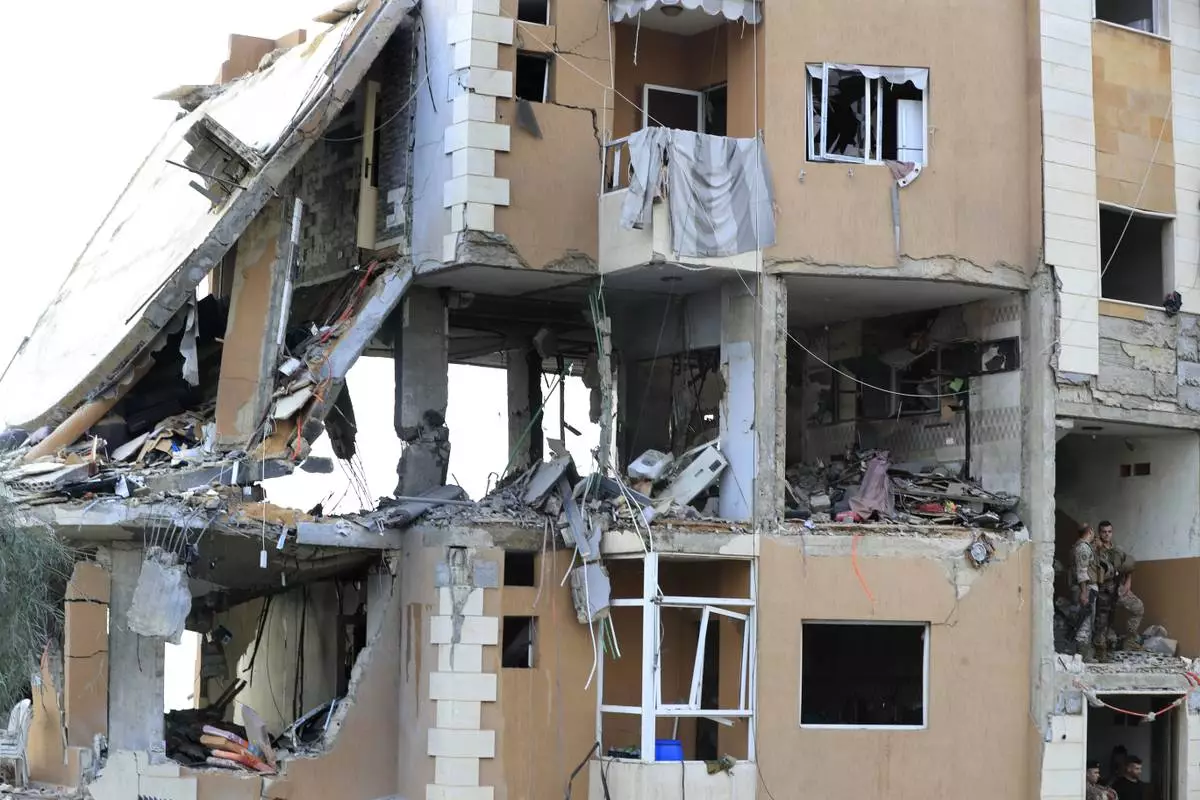
Lebanese army soldiers stand guard on a destroyed building hit by an Israeli airstrike, in Barja village, south of Beirut, Lebanon, Saturday, Oct. 12, 2024. (AP Photo/Mohammed Zaatari)
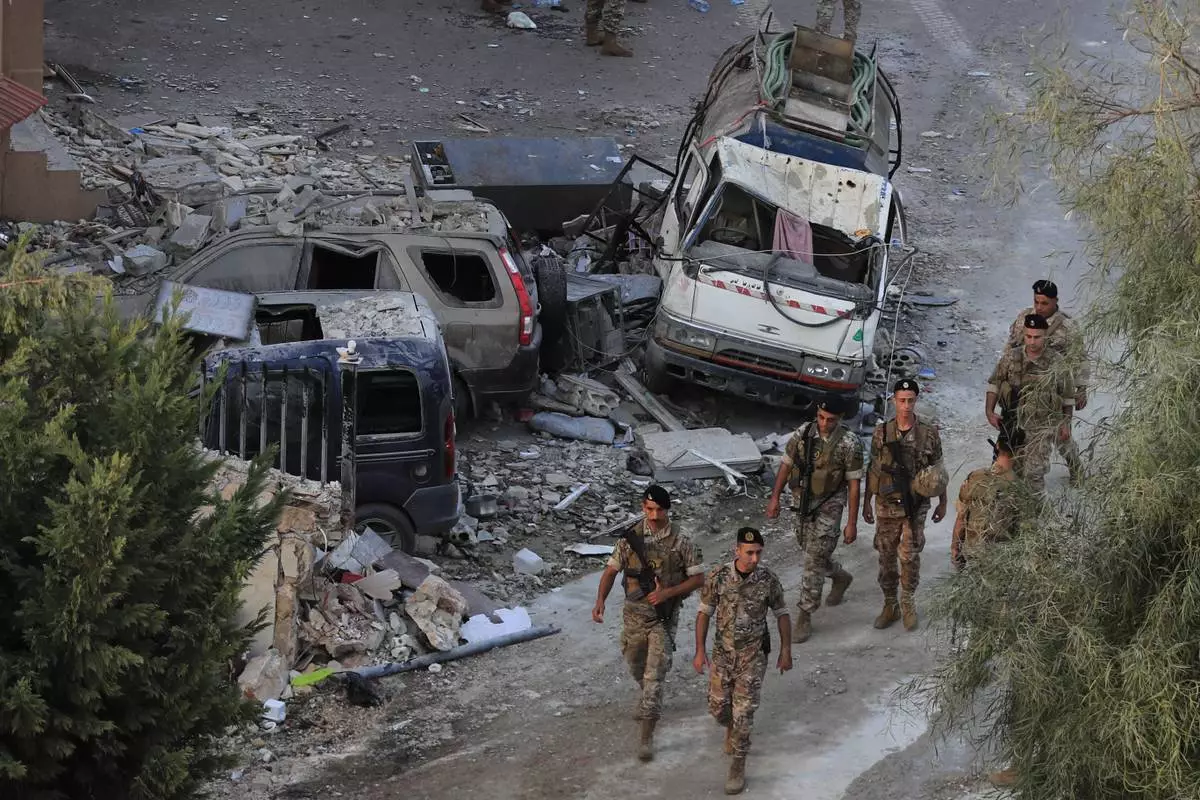
Lebanese army soldiers walk by destroyed cars at the site where an Israeli airstrike hit a building, in Barja village, south of Beirut, Lebanon, Saturday, Oct. 12, 2024. (AP Photo/Mohammed Zaatari)
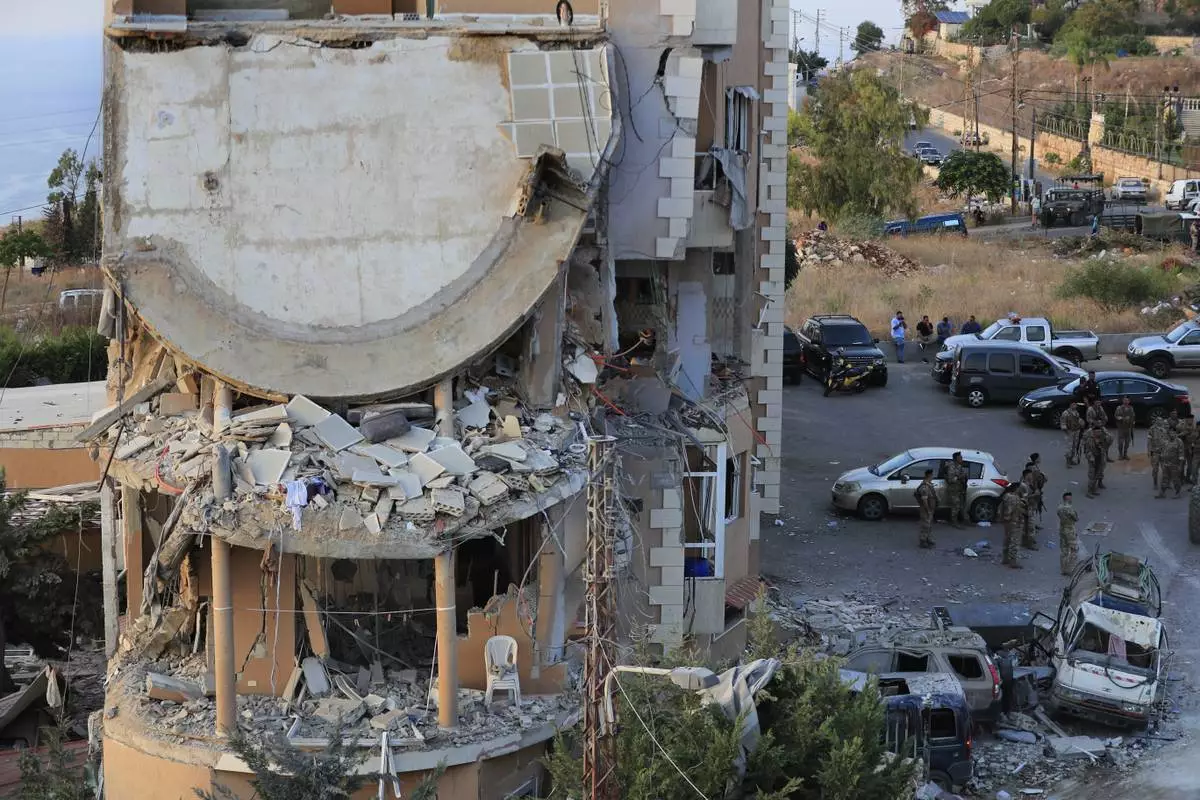
Lebanese army soldiers deploy around a destroyed building hit by an Israeli airstrike, in Barja village, south of Beirut, Lebanon, Saturday, Oct. 12, 2024. (AP Photo/Mohammed Zaatari)
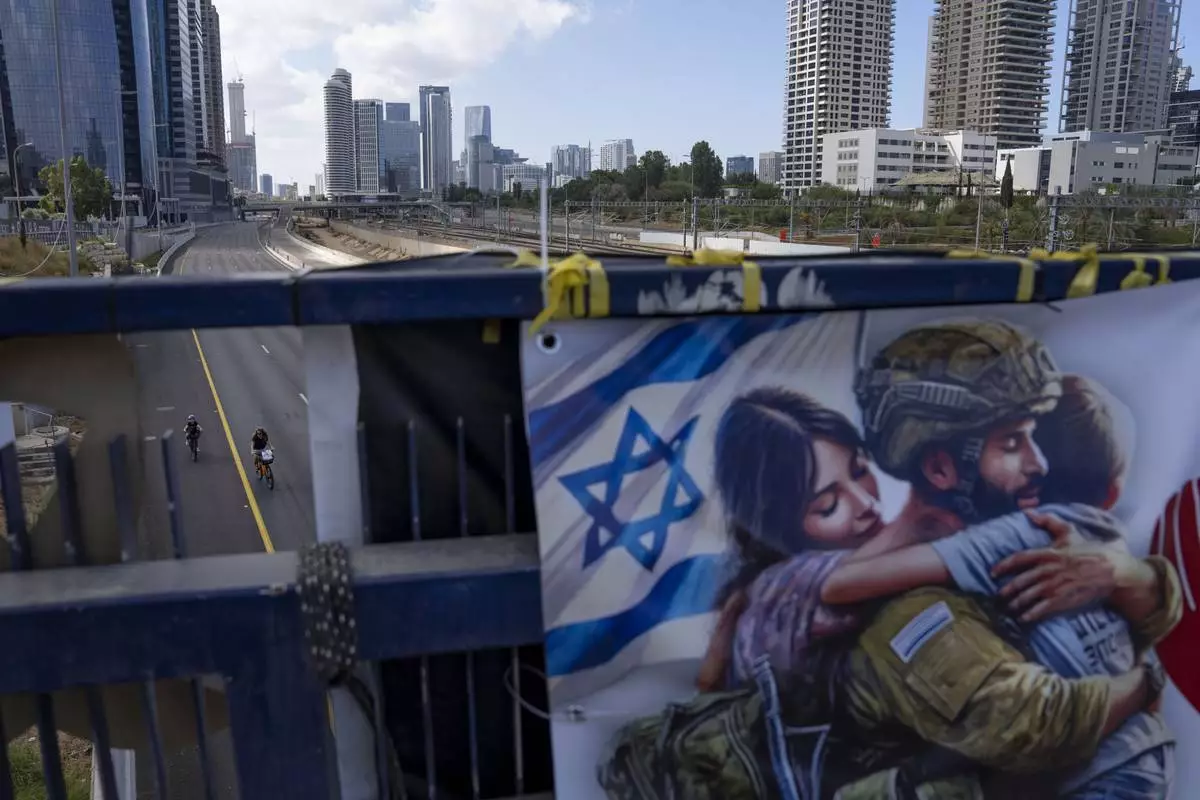
Cyclists ride on a car-free highway during the Jewish holiday of Yom Kippur in Tel Aviv, Israel, on Saturday, Oct. 12, 2024. (AP Photo/Oded Balilty)
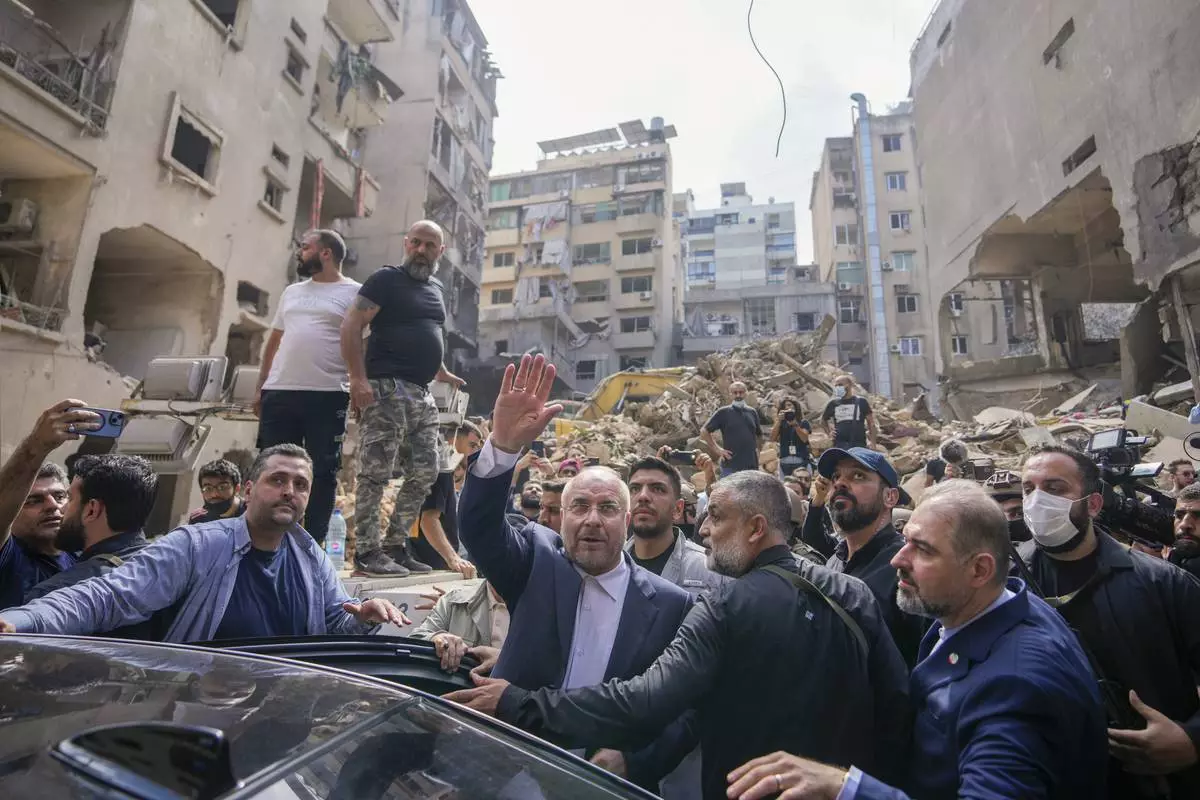
Iran's parliament speaker Mohammad Bagher Qalibaf waves to residents as visit the site of Thursday's Israeli airstrike, in Beirut, Lebanon, Saturday, Oct. 12, 2024. (AP Photo/Hassan Ammar)
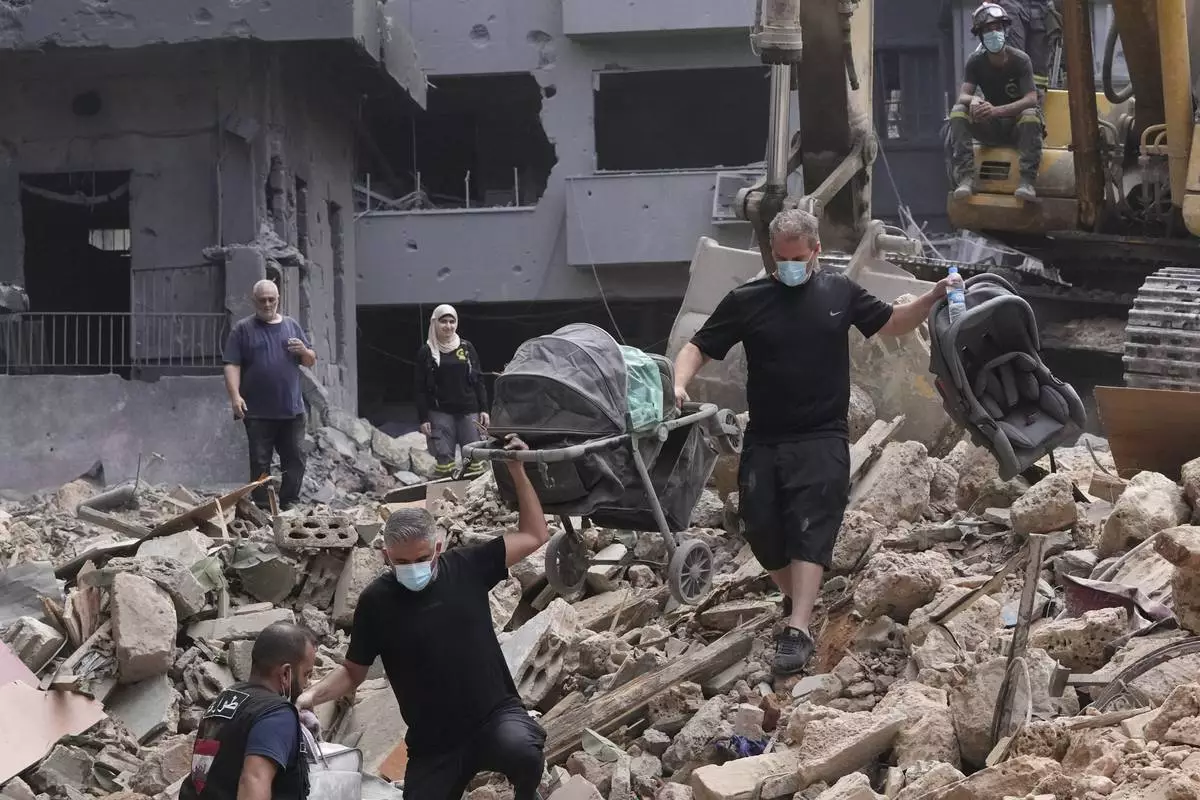
Residents of a building damaged in an Israeli airstrike return to collect their family's belongings at the site of Thursday's Israeli airstrike in Beirut, Lebanon, Saturday, Oct. 12, 2024. (AP Photo/Hassan Ammar)
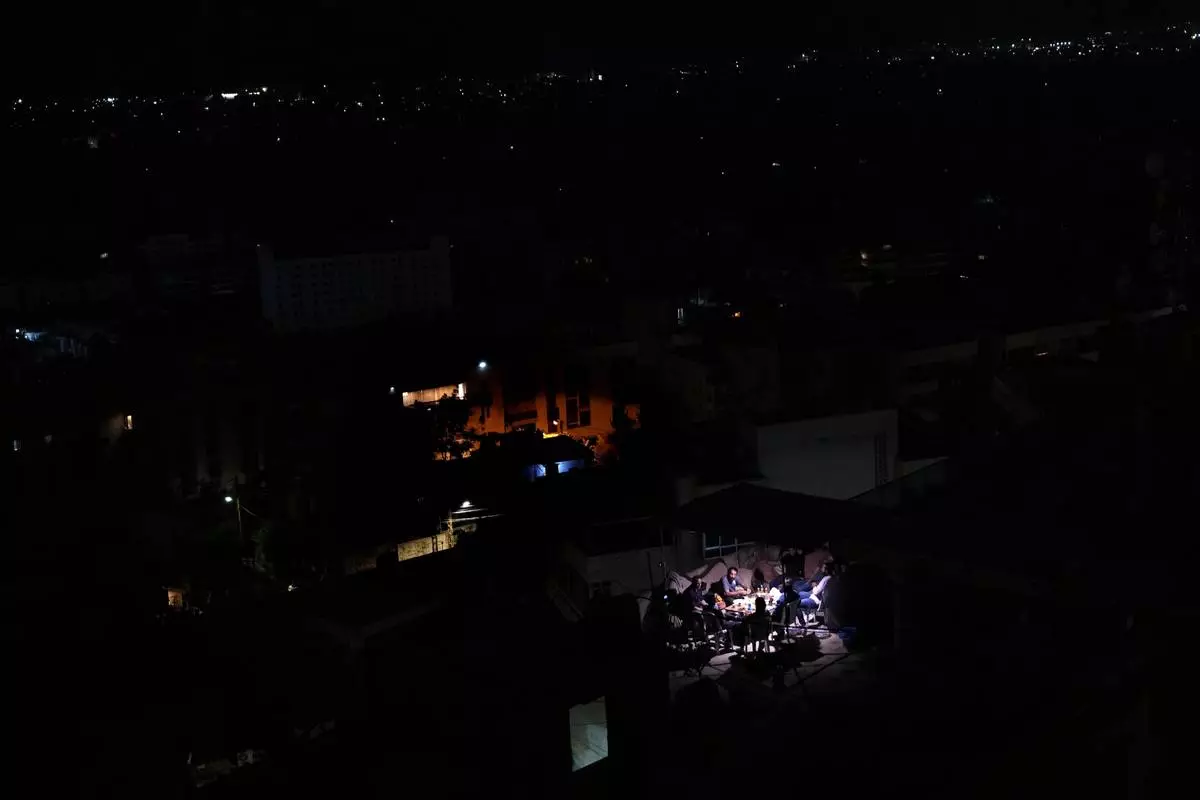
Residents sit on the roof of a building and have dinner as Dahiyeh suburb, background, remains in darkness after Israeli airstrikes, Lebanon, Friday, Oct. 11, 2024. (AP Photo/Hassan Ammar)


















